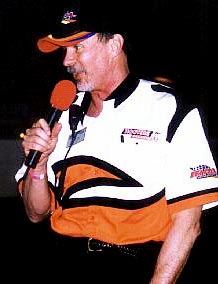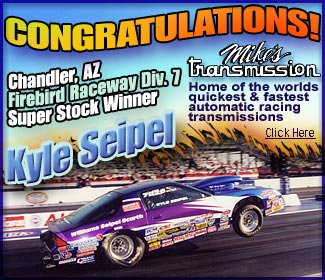|
<<
PREVIOUS PAGE
 Eventually,
by working at the racetrack, I saved enough
money to put myself through college, at Ohio
University, where I actually got two degrees:
one in communications, with specialization in
radio and TV and journalism. Eventually,
by working at the racetrack, I saved enough
money to put myself through college, at Ohio
University, where I actually got two degrees:
one in communications, with specialization in
radio and TV and journalism.
DRO: Did you go
straight into racing when you graduated?
Polburn: Well,
I graduated from there in '74 and I worked for
a company that owned three oval tracks and two
dragstrips, including Thompson Dragway. I actually
got into the oval-track business for awhile,
but we eventually decided that wasn't the way
to go and we decided to get into the ownership,
or lease-ship, of various and sundry racetracks,
and that's how my real career at Thompson started.
DRO: So, have
you spent your entire life in drag racing, or
have you had other businesses along the way?
Polburn: No, actually,
in 1983 we started a business called Concepts
Inc. that was an indoor motorsports deal with
monster trucks and indoor thrill shows in arenas
and stadiums, and that kind of thing. We had
it for about 15 years and grew it into the fourth-
or fifth-largest company of its kind in the
country before I sold that to SFX/Clear Channel.
And at that time I was also a consultant at
Norwalk Raceway Park, helping out [NRP owner]
Bill (Bader) and at other racetracks around
the country with advertising and promotions.
So, I dabbled in it for a number of years while
I was doing all that indoor stuff. When I sold
that company in 1998, it was the same time that
Bill decided he wanted to get more involved
in drag racing and he and I decided to team
up and try this IHRA thing.
DRO: Was your
history with SFX and later Clear Channel crucial
to their purchase of IHRA?
Polburn: Well,
they were partners of mine in various shows
for almost 15 years, so yeah, I had a huge relationship
there. And as their company grew, so did mine.
ADVERTISEMENT
 |
|
I don't know if it crucial to their purchase,
but I think there was a comfort level there
since we had done business together for so long.
They knew me; they knew Bill; they knew how
we did business; they saw the successes of the
Motorsports businesses that we were already
in, so it certainly helped.
DRO: Did you own
a piece of IHRA, too, before Clear Channel took
it over?
Polburn: Yes.
Bill was a majority owner and I was the minority
owner.
DRO: What's a
typical day like for you back at the office?
Polburn: There
is no typical day. We might be working on buying
media for the new race at Edmonton for a couple
of hours, and then switch over to putting together
the next ACDelco program at Virginia Motorsports
Park, and then work the sponsorship side of
things, because my wife and I also handle sponsorship
sales for events and the series.
It changes constantly. And typically, in a
single day, you will answer 25 to 40 phone calls
and probably as many e-mails just to communicate
with racers, and sponsors, and racetracks wanting
to know how to do this or how to do that. Like
the title says, it's just a lot of stuff.
DRO: What kinds
of interaction do you have with the racers?
Polburn: They'll
call me with questions on how best to put together
a proposal, or we'll work together on a potential
sponsor for their race team. In this business,
if you don't work together, you're dead. A lot
of racers bring us great ideas, and hopefully
we can reciprocate and give them great ideas.
For them to grow and for us to grow, we all
have to work together, or we quite literally
will be dead. We talk to them every day.
|